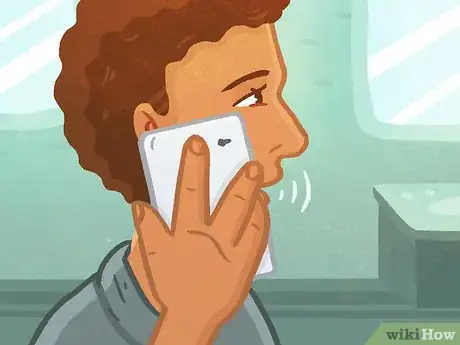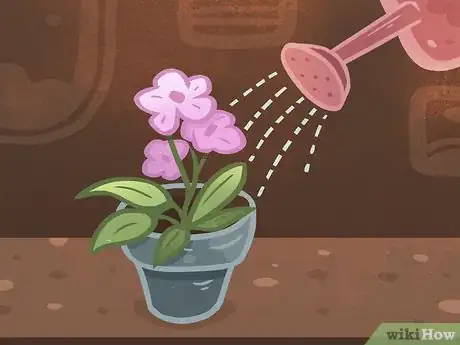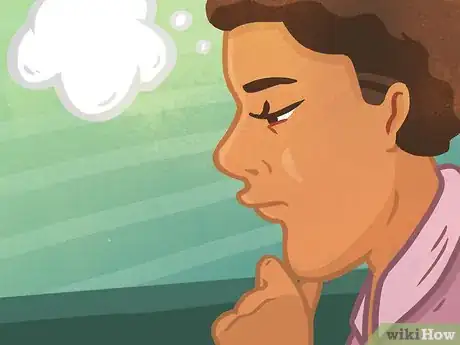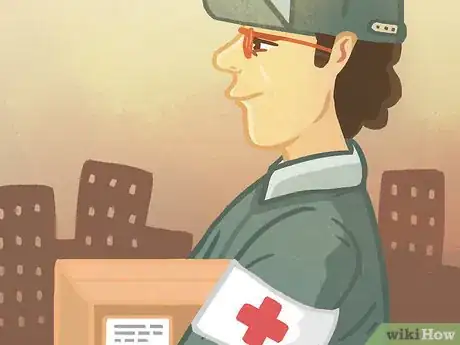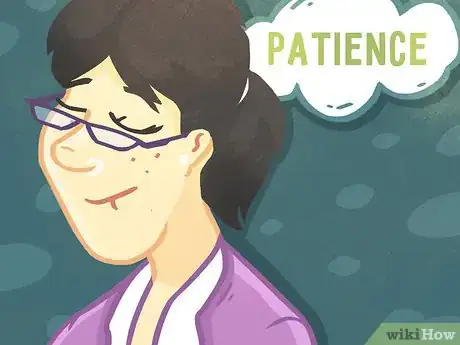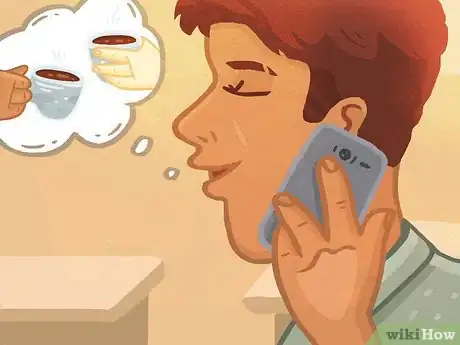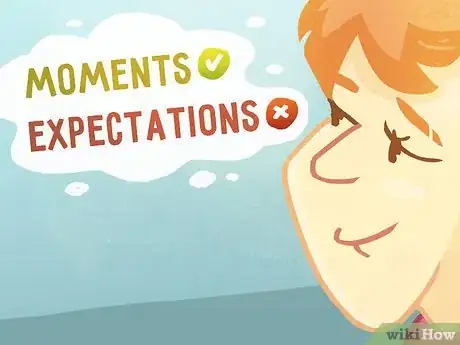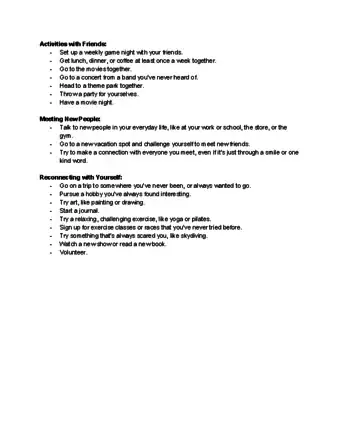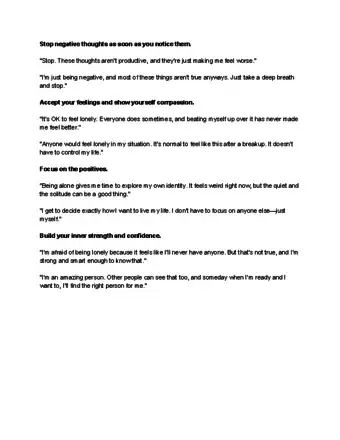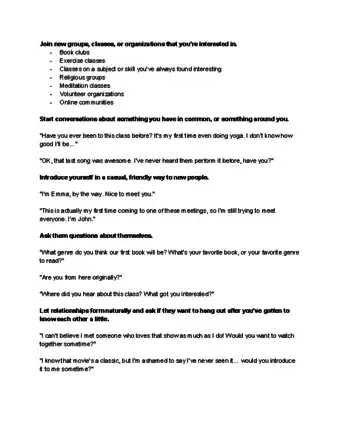This article was co-authored by Klare Heston, LCSW. Klare Heston is a Licensed Independent Clinical Social Worker based in Cleveland, Ohio. With experience in academic counseling and clinical supervision, Klare received her Master of Social Work from the Virginia Commonwealth University in 1983. She also holds a 2-Year Post-Graduate Certificate from the Gestalt Institute of Cleveland, as well as certification in Family Therapy, Supervision, Mediation, and Trauma Recovery and Treatment (EMDR).
There are 22 references cited in this article, which can be found at the bottom of the page.
This article has been viewed 1,024,294 times.
When you're single, it can be hard to see happy couples showing affection. However, being single can be a great time to deepen relationships with friends and family, pursue hobbies, achieve professional goals, and get to know yourself better! If you're struggling with loneliness, work on building your confidence in social settings. It might seem daunting at first, but try to put yourself out there, meet new people, and let your relationships evolve naturally.
Steps
Developing a Positive Mindset
-
1Try to appreciate the perks of being single. Being in a relationship does not make you a better, more successful person, so don't think less of yourself for being single. Instead, think about the positive aspects of single life. You have the freedom to choose where you live and what you do, and you don’t have to deal with the stress and annoyances that come with any relationship.[1]
- Being single also allows you to put your professional and personal goals first. Plenty of people in committed relationships wish they could pursue their own goals without having to compromise.
-
2Reach out to loved ones when you feel lonely. Call an old friend and catch up, ask a loved one to have coffee or lunch, or invite some people over for a game night. A romantic partnership is not the only satisfying type of relationship. In fact, being single is the perfect time to nurture other relationships that can last a lifetime.[2]
- If you want to vent about your feelings, be honest with your trusted loved ones. It might be hard to talk about being lonely at first, but discussing it with a friend or relative can help you feel better.
- Take advantage of technology to stay connected with loved ones. When seeing each other face-to-face isn’t possible, talk on the phone, exchange emails, connect through social media, or schedule video chats.[3]
Advertisement -
3Add some cheer to your home. If your environment is dreary, work on creating a happy, vibrant space to help combat the lonely blues. Try giving your room a fresh coat of paint in a bright color, like a revitalizing green or chipper blue.[4]
- Get some flowers or plants to liven up your house.
- Open the window blinds and swap heavy, dark drapes for sheer curtains. Letting more light into your home can help you feel more connected to the outside world.
- Try to cut down on clutter, too. A more organized home can help promote a positive mindset.[5]
-
4Exercise for at least 30 minutes per day. Regular exercise improve both physical and mental health. Go for activities that get you out of the house. Try walking around your neighborhood, going for nature, swimming, or taking a group yoga, spin, or martial arts class.[6]
- Walking around your neighborhood can help you get to know more of your neighbors, and a group exercise class is a great way to meet new people.[7]
-
5Take up a new hobby. Learning something new can be a rewarding experience and help you cultivate new skills. Joining a club or taking a class can also help you meet people who share similar interests.[8]
- For example, pursue interests in cooking, gardening, or crafting. Turn your solo hobbies into social activities by joining clubs or taking classes on these topics.
- Look online for classes or clubs, or check related businesses or organizations for social opportunities. For instance, if you’re into gardening, see if a local garden center offers gardening classes.
-
6Treat yourself with rewards that require leaving the house. Going shopping for new clothes, getting a new haircut, or getting a massage are great ways to practice self-love. Checking out new shops, restaurants, and other public places also provides opportunities to interact with other people.[9]
- Put yourself out there and treat yourself to a movie, play, or concert. These don’t only have to be “date” activities; they’re things that you can enjoy all on your own.
- Go on a trip to a place you’ve always wanted to visit. Best of all, you don’t have to negotiate another person or deal with their quirks, like wanting to stop at an attraction you don’t care for or not wanting to fly.
-
7Get a new furry friend. If you’re sick of coming home to an empty house, a furry companion can offer unconditional love and help curb feelings of loneliness. Additionally, pets can improve your overall health, such as by lowering blood pressure and promoting exercise.[10]
- Pets can also provide opportunities to become more social. For instance, having a dog is a great conversation starter, and you’ll need to leave the house more to walk your pooch.
-
8Remember that everyone feels lonely sometimes. Try not to idealize relationships, or think that dating and marriage are cure-alls. Being in a relationship with someone isn't easy, and even people in relationships feel lonely.[11]
- Feeling lonely is part of being human and, in a way, it’s sort of a good thing. Loneliness prompts people to seek connections with others, so it’s part of the foundation of all relationships.
Building Your Social Confidence
-
1Redirect negative, critical thoughts. If you start to think thoughts like “I’m not good enough,” or “There’s something wrong with me,” say to yourself, “Stop! These are not productive thoughts, and I have the power to change my mindset.” The first step to being confident in social situations is to change the thought patterns that give rise to insecurity.[12]
- Harsh self-criticism is usually based on distorted thinking. Stop beating yourself up, remain objective, and challenge distorted thoughts.
- Don't dwell on past relationships or think of them as "failures." Accept the fact that you can't change the past. Instead, move on and seize opportunities to become a more fulfilled and fruitful person.
-
2Work on making yourself vulnerable. You don’t have to be perfect to form new platonic or romantic relationships. In fact, being open and honest about vulnerabilities is how people bond with each other. Accept your imperfections, work on what you can change, and show yourself some compassion.[13]
- Try not to fear being rejected. If things don’t work out with a potential friend or partner, don’t assume that it’s your fault or there’s something wrong with you. Sometimes people are incompatible, have a misunderstanding, or are just in a bad mood.[14]
-
3Take healthy social risks. It might feel stressful and risky, but you have to meet and interact with people in order to curb loneliness. Put yourself out there and make connections with new people. With each baby step, you’ll get a little more comfortable in your own skin.[15]
- Challenge yourself to try new things, to talk to new people, and to engage in unfamiliar situations. If your coworkers invite you out after work, take them up on their offer. If you’re in line at the store, strike up conversation with the person next to you or with the cashier.
-
4Spur conversations by asking questions. If you’re anxious about awkward silences or not knowing what to say, just ask questions. Most people like talking about themselves, so asking questions is a good way to get a conversation flowing.[16]
- You could ask someone “What do you do for work,” or “Have you seen any good movies lately?”
- If you’re at a party, you could ask, “So how do you know the host?”
- While waiting for class to start, you could ask the person next to you, “How about that pop quiz yesterday? It really pulled the rug right out from under me!”
-
5Build your confidence in social settings gradually. Set reasonable expectations, and work on improving your social confidence one step at a time. For instance, you could start by smiling and waving at a neighbor while walking down the street. [17]
- The next time you see your neighbor, you could introduce yourself and take a minute to chat. You could talk about the neighborhood, say how cute their dog is, or compliment their garden.
- As you become friendly, you could invite them over for coffee or tea
Meeting New People
-
1Join a new social group. You could see if there’s a book club through your local library or coffee house. If you’re passionate about a particular set of issues or social causes, do some internet searching to see if there are any clubs or organizations in your area that focus on the same causes.[18]
- If you’re religious, consider joining a place of worship or participating in a meditation or prayer group.
-
2Volunteer for your favorite charitable cause. Volunteering can help keep you busy and raise your self-esteem. In addition, volunteering for a cause you value can put you in touch with like-minded people.[19]
- For example, you could volunteer at a shelter if you love animals, raise awareness for a disease that affected a loved one, or canvas for a political cause close to your heart.
-
3Join an online community. In addition to dating online, there are lots of ways to connect with other people via the internet. Play online games with chat features, chat on forums on topics that interest you, and meet people on social media.[20]
- Interacting with others online can help you develop social skills if you’re anxious about meeting people face-to-face. Just remember to practice internet safety, and avoid sharing private information.
-
4Try to let relationships form naturally. Do your best not to rush into platonic or romantic relationships. Allow your connections with others to evolve over time, and don’t feel like you have to force things. Have patience, and give your relationships time to develop solid foundations.[21]
- It’s better to be single than to rush into a relationship with someone who doesn’t have your best interests in mind. Someone will come along when you least expect it, so try to stay patient and positive.
Going on Dates
-
1Set up an online dating profile. Try to be yourself when you fill out your profile. Talk about positive things, like your hobbies and things you like, instead listing your annoyances or boasting about being the best at something. Read everything you write out loud, and make sure it sounds conversational instead of clunky or cocky.[22]
- Try to set realistic expectations, proceed slowly, and listen to your instincts. If you hit it off with someone via email or text, move on to phone conversations and schedule a date. While you don’t want to rush things, it’s important to work on building a connection with someone instead of just texting for weeks.
- Try not to think that someone is “the one” or that you have an instant connection with them, especially before the first date. It’s easy to idealize someone before meeting them in person, and you should allow your relationship to develop without preconceived notions.
-
2Build your confidence so you can ask people out in person. Aside from online dating sites, you might also meet potential dates at the grocery store, a club or class, at a party, or at your gym. The idea of asking someone out might be daunting, but becoming more comfortable in basic social situations can help you overcome shyness.[23]
- Work on starting conversations when you're out and about, and try to talk to both people you're attracted to and those you're not. To break the ice, you could mention the weather, ask for advice, or pay them a compliment.
- Try to develop a more confident mindset with positive self-talk. Instead of thinking, "I'm a shy person and can't ask someone out," say to yourself, “I'm shy sometimes, but I can get past it.”
-
3Stay calm and casual when you ask someone on a date. As you become more comfortable with people in general, challenge yourself to ask someone on a date. Chat with them to break the ice. Then, if the conversation goes well, ask them if they want to meet for a coffee or drink some time.[24]
- For instance, you might see someone at a coffee shop carrying a book by your favorite author. You might say something like, “Oh, I've always loved Nabokov,” or “I didn't know people still read real books!”
- During your conversation, you might ask questions such as, “Have you read many of his books? Which is your favorite? Who's your favorite author?”
- If you seem to hit it off, ask to continue to the conversation. Keep it casual, and think of it as asking a friend to hang out with you. Say, “I've got to get to work, but I'm really enjoying this conversation. Would you be interested in continuing it over coffee some time this week?”
-
4Start with a brief encounter, like coffee or a drink. A good first date is low-pressure, brief, and lets you and your date get a feel for each other. Chatting over coffee or cocktails helps break the ice without the formality or pressure of a dinner date.[25]
- Set reasonable expectations, and try not to decide if someone is unsuitable just because they're not perfect. However, if you're absolutely sure right off the bat that the person isn't right for you, at least grabbing a coffee or drink isn't a major investment of your time or money.
-
5Go on second and third dates that allow you to talk. If the first date went well, ask them if they'd like to have dinner, walk around a park, make a picnic, or go to the zoo. Getting to know each other is important at this stage, so go for activities that don't get in the way of talking.[26]
- Date ideas to avoid include going to the movies and noisy bars. Additionally, it's best to spend time alone at this point, so hold off on doing activities with lots of friends. Instead, try to find a date that balances activities you like and activities your date likes.
-
6Stay open and optimistic instead of setting high expectations. When you hit it off with someone, it's tempting to fantasize about where it will go. However, instead of writing your relationship's script before it can get off the ground, try to enjoy each moment that naturally unfolds.[27]
- Not every relationship has to develop into a marriage or long-term partnership. Casually dating someone can be fun, and it helps you get a better sense of what you need in a partner.
- Have a good time, and try not to pressure yourself with rigid expectations. Remind yourself that love happens when you least expect it, and that there are plenty of aspects of life that resist your control.
Ideas for Having Fun and Staying Positive
Warnings
References
- ↑ https://www.psychologytoday.com/us/blog/bouncing-back/201606/5-reasons-singles-should-stop-worrying
- ↑ https://www.ncbi.nlm.nih.gov/pmc/articles/PMC3874845/
- ↑ http://www.apa.org/helpcenter/emotional-support.aspx
- ↑ http://www.worldgbc.org/sites/default/files/160705_Healthy_Homes_UK_full_report.pdf
- ↑ https://www.psychologytoday.com/us/blog/the-truisms-wellness/201607/the-powerful-psychology-behind-cleanliness
- ↑ https://www.healthdirect.gov.au/exercise-and-mental-health
- ↑ https://www.ncbi.nlm.nih.gov/pmc/articles/PMC3874845/
- ↑ https://www.health.harvard.edu/aging/5-ways-to-fight-loneliness-and-isolation
- ↑ https://www.healthdirect.gov.au/loneliness-isolation-mental-health
- ↑ https://www.cdc.gov/healthypets/health-benefits/index.html
- ↑ https://www.psychologytoday.com/us/blog/the-clarity/201708/dealing-loneliness
- ↑ https://www.ncbi.nlm.nih.gov/pmc/articles/PMC3874845/
- ↑ https://www.helpguide.org/articles/relationships-communication/dealing-with-loneliness-and-shyness.htm
- ↑ https://www.psychologytoday.com/us/articles/200307/build-your-confidence
- ↑ https://www.psychologytoday.com/us/blog/the-clarity/201708/dealing-loneliness
- ↑ https://www.psychologytoday.com/us/blog/how-be-yourself/201605/6-ways-ease-shyness-and-get-yourself-out-there
- ↑ https://www.helpguide.org/articles/relationships-communication/dealing-with-loneliness-and-shyness.htm
- ↑ https://www.healthdirect.gov.au/loneliness-isolation-mental-health
- ↑ https://www.betterhealth.vic.gov.au/health/healthyliving/making-friends
- ↑ https://www.healthdirect.gov.au/loneliness-isolation-mental-health
- ↑ https://www.psychologytoday.com/us/blog/meet-catch-and-keep/201401/learning-love-not-fear-being-single
- ↑ https://www.psychologytoday.com/us/blog/the-introverts-corner/201603/writing-online-dating-profile-works
- ↑ https://psychcentral.com/lib/how-can-a-shy-adult-get-dates-without-using-online-dating/
- ↑ https://psychcentral.com/lib/how-can-a-shy-adult-get-dates-without-using-online-dating/
- ↑ https://www.psychologytoday.com/us/blog/fighting-fear/201709/strategy-dating
- ↑ https://www.psychologytoday.com/us/blog/fighting-fear/201309/what-do-second-or-third-date
- ↑ https://psychcentral.com/lib/adult-dating-from-attraction-to-commitment-part-1/2/
- ↑ https://www.researchgate.net/publication/228342191_Singles_in_society_and_science
- ↑ https://www.nimh.nih.gov/health/publications/social-anxiety-disorder-more-than-just-shyness/index.shtml
About This Article
Feeling lonely sometimes when you're single is completely normal, and there are things you can do to start feeling better and even enjoy being single. One thing that can really help is finding a new hobby or project to work on. It can be anything, like learning a new instrument, studying a foreign language, or building a garden in your yard. Keeping yourself busy will take your mind off of being single, and you'll grow as a person while learning something new. It's also helpful to push yourself to do something social at least once a day. You can meet up with friends, visit a family member, or even just talk on the phone with someone for a bit. Staying connected with others is one of the best ways to combat loneliness. Additionally, try to exercise regularly and eat a healthy diet. It's not always easy when you're feeling upset, but staying healthy will give you more energy and have a positive effect on how you feel mentally. If you feel like you need some help dealing with how you're feeling, don't be afraid to reach out for help. You're not alone, and things will get better! Keep reading for tips on brightening your mood and staying optimistic!

